When they say, “Spring is in the air,” they aren’t kidding. New York City is fully abloom–and it is most certainly in the air.
Yes, the tulips and daffodils are afoot in the city! Perfectly coiffed Park Avenue flower arrangements trumpet out enormous lilies at pedestrians. Petunias and pansies galore! Primped poodles in their fluffed white glory don’t give damn about signs directing them away from the flower plots, it’s all the same to them—they’re just happy to be out of winter coats. Bees of all kinds are quite busy. Poets are everywhere with little black notebooks, scribbling furiously at the crocuses sprouting up around trees in the parks.
But most New Yorkers (poets included, we just persevere and suffer later) are walking around in a Claritin daze, and it’s worse than ever. Itchy eyes, sneezing, throats ablaze. Doctors are saying this year’s pollen boom is the most prolific one in years.
Lately, reading poems about spring, and flowers, I’ve concocted a new fantasy “condition,” or maybe it’s a genre (same thing?): The Pollen-Poem. What does this marvelous thing entail? First and foremost, the Pollen-Poem is occasional: it is written only in spring and concerns only spring, in depth. And I mean obsessively in-depth, full-on obsession, rapture (if you will). Dysfunctional relationships with flowers, things of that nature. Then, think of the effects of a severe pollen allergy. Heightened sensitivity! Irritation of specific registers of the body (being)! Moodiness! Sometimes, a good Pollen-Poem will make your eyes itch. Couple all this with a poet’s faculties and the Pollen-Poem is born. I exemplify here for you some of the most perfect Pollen-Poems written to date (At least the ones that appeal to me–and not just in my fleeting, second-dose-of-the-day, non-drowsy, appetite-suppressed opinion).
| Little Lion Face | ||
| by May Swenson | ||
Little lion face I stopped to pick among the mass of thick succulent blooms, the twice streaked flanges of your silk sunwheel relaxed in wide dilation, I brought inside, placed in a vase. Milk of your shaggy stem sticky on my fingers, and your barbs hooked to my hand, sudden stings from them were sweet. Now I'm bold to touch your swollen neck, put careful lips to slick petals, snuff up gold pollen in your navel cup. Still fresh before night I leave you, dawn's appetite to renew our glide and suck. An hour ahead of sun I come to find you. You're twisted shut as a burr, neck drooped unconscious, an inert, limp bundle, a furled cocoon, your sun-streaked aureole eclipsed and dun. Strange feral flower asleep with flame-ruff wilted, all magic halted, a drink I pour, steep in the glass for your undulant stem to suck. Oh, lift your young neck, open and expand to your lover, hot light. Gold corona, widen to sky. I hold you lion in my eye sunup until night. |
||
| (211) | ||
| by Emily Dickinson | ||
Come slowly—Eden Lips unused to Thee— Bashful—sip thy Jessamines As the fainting Bee— Reaching late his flower, Round her chamber hums— Counts his nectars— Enters—and is lost in Balms.
| Nothing Stays Put | ||
| by Amy Clampitt | ||
In memory of Father Flye, 1884-1985
The strange and wonderful are too much with us. The protea of the antipodes--a great, globed, blazing honeybee of a bloom-- for sale in the supermarket! We are in our decadence, we are not entitled. What have we done to deserve all the produce of the tropics-- this fiery trove, the largesse of it heaped up like cannonballs, these pineapples, bossed and crested, standing like troops at attention, these tiers, these balconies of green, festoons grown sumptuous with stoop labor? The exotic is everywhere, it comes to us before there is a yen or a need for it. The green- grocers, uptown and down, are from South Korea. Orchids, opulence by the pailful, just slightly fatigued by the plane trip from Hawaii, are disposed on the sidewalks; alstroemerias, freesias fattened a bit in translation from overseas; gladioli likewise estranged from their piercing ancestral crimson; as well as, less altered from the original blue cornflower of the roadsides and railway embankments of Europe, these bachelor's buttons. But it isn't the railway embankments their featherweight wheels of cobalt remind me of, it's a row of them among prim colonnades of cosmos, snapdragon, nasturtium, bloodsilk red poppies, in my grandmother's garden: a prairie childhood, the grassland shorn, overlaid with a grid, unsealed, furrowed, harrowed and sown with immigrant grasses, their massive corduroy, their wavering feltings embroidered here and there by the scarlet shoulder patch of cannas on a courthouse lawn, by a love knot, a cross stitch of living matter, sown and tended by women, nurturers everywhere of the strange and wonderful, beneath whose hands what had been alien begins, as it alters, to grow as though it were indigenous. But at this remove what I think of as strange and wonderful, strolling the side streets of Manhattan on an April afternoon, seeing hybrid pear trees in blossom, a tossing, vertiginous colonnade of foam, up above-- is the white petalfall, the warm snowdrift of the indigenous wild plum of my childhood. Nothing stays put. The world is a wheel. All that we know, that we're made of, is motion. |
||
(Achoo.)
(Achoo.)
(Achoo.)


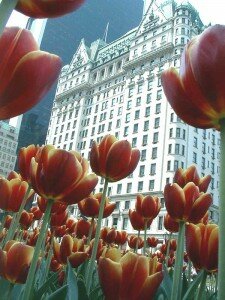
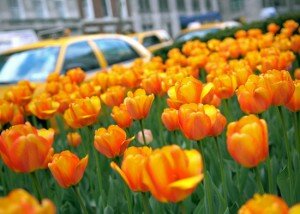
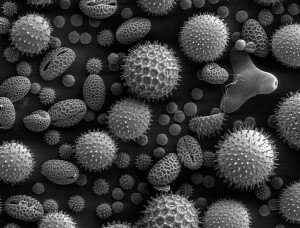

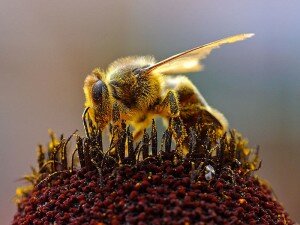
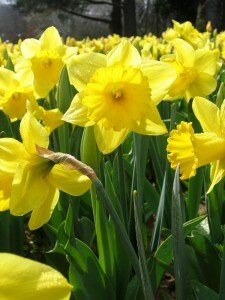
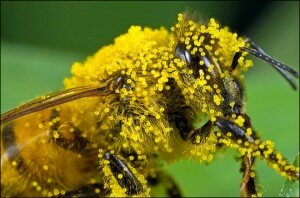
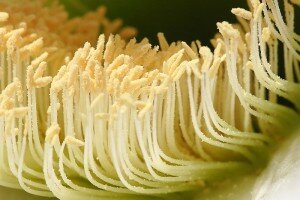
{ 0 comments… add one now }